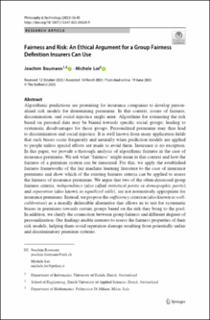Please use this identifier to cite or link to this item:
https://doi.org/10.21256/zhaw-29512Full metadata record
| DC Field | Value | Language |
|---|---|---|
| dc.contributor.author | Baumann, Joachim | - |
| dc.contributor.author | Loi, Michele | - |
| dc.date.accessioned | 2024-01-04T15:07:15Z | - |
| dc.date.available | 2024-01-04T15:07:15Z | - |
| dc.date.issued | 2023-06-19 | - |
| dc.identifier.issn | 2210-5433 | de_CH |
| dc.identifier.issn | 2210-5441 | de_CH |
| dc.identifier.uri | https://digitalcollection.zhaw.ch/handle/11475/29512 | - |
| dc.description | Erworben im Rahmen der Schweizer Nationallizenzen (http://www.nationallizenzen.ch) | de_CH |
| dc.description.abstract | Algorithmic predictions are promising for insurance companies to develop personalized risk models for determining premiums. In this context, issues of fairness, discrimination, and social injustice might arise: Algorithms for estimating the risk based on personal data may be biased towards specific social groups, leading to systematic disadvantages for those groups. Personalized premiums may thus lead to discrimination and social injustice. It is well known from many application fields that such biases occur frequently and naturally when prediction models are applied to people unless special efforts are made to avoid them. Insurance is no exception. In this paper, we provide a thorough analysis of algorithmic fairness in the case of insurance premiums. We ask what "fairness" might mean in this context and how the fairness of a premium system can be measured. For this, we apply the established fairness frameworks of the fair machine learning literature to the case of insurance premiums and show which of the existing fairness criteria can be applied to assess the fairness of insurance premiums. We argue that two of the often-discussed group fairness criteria, independence (also called statistical parity or demographic parity) and separation (also known as equalized odds), are not normatively appropriate for insurance premiums. Instead, we propose the sufficiency criterion (also known as well-calibration) as a morally defensible alternative that allows us to test for systematic biases in premiums towards certain groups based on the risk they bring to the pool. In addition, we clarify the connection between group fairness and different degrees of personalization. Our findings enable insurers to assess the fairness properties of their risk models, helping them avoid reputation damage resulting from potentially unfair and discriminatory premium systems. | de_CH |
| dc.language.iso | en | de_CH |
| dc.publisher | Springer | de_CH |
| dc.relation.ispartof | Philosophy & Technology | de_CH |
| dc.rights | https://creativecommons.org/licenses/by/4.0/ | de_CH |
| dc.subject | Actuarial fairness | de_CH |
| dc.subject | Algorithmic fairness | de_CH |
| dc.subject | Group fairness criteria | de_CH |
| dc.subject | Moral philosophy | de_CH |
| dc.subject | Prediction-based decision making | de_CH |
| dc.subject | Risk | de_CH |
| dc.subject | Sufficiency | de_CH |
| dc.subject.ddc | 006: Spezielle Computerverfahren | de_CH |
| dc.subject.ddc | 170: Ethik | de_CH |
| dc.title | Fairness and risk : an ethical argument for a group fairness definition insurers can use | de_CH |
| dc.type | Beitrag in wissenschaftlicher Zeitschrift | de_CH |
| dcterms.type | Text | de_CH |
| zhaw.departement | School of Engineering | de_CH |
| zhaw.organisationalunit | Institut für Datenanalyse und Prozessdesign (IDP) | de_CH |
| dc.identifier.doi | 10.1007/s13347-023-00624-9 | de_CH |
| dc.identifier.doi | 10.21256/zhaw-29512 | - |
| dc.identifier.pmid | 37346393 | de_CH |
| zhaw.funding.eu | No | de_CH |
| zhaw.issue | 45 | de_CH |
| zhaw.originated.zhaw | Yes | de_CH |
| zhaw.publication.status | publishedVersion | de_CH |
| zhaw.volume | 36 | de_CH |
| zhaw.publication.review | Peer review (Publikation) | de_CH |
| zhaw.funding.snf | 187473 | de_CH |
| zhaw.funding.zhaw | Socially acceptable AI and fairness trade-offs in predictive analytics | de_CH |
| zhaw.funding.zhaw | Algorithmic Fairness in data-based decision making: Combining ethics and technology | de_CH |
| zhaw.author.additional | No | de_CH |
| zhaw.display.portrait | Yes | de_CH |
| Appears in collections: | Publikationen School of Engineering | |
Files in This Item:
| File | Description | Size | Format | |
|---|---|---|---|---|
| 2023_Baumann-Loi_Fairness-risk-group-fairness-definition-insurers.pdf | 932.5 kB | Adobe PDF |  View/Open |
Show simple item record
Baumann, J., & Loi, M. (2023). Fairness and risk : an ethical argument for a group fairness definition insurers can use. Philosophy & Technology, 36(45). https://doi.org/10.1007/s13347-023-00624-9
Baumann, J. and Loi, M. (2023) ‘Fairness and risk : an ethical argument for a group fairness definition insurers can use’, Philosophy & Technology, 36(45). Available at: https://doi.org/10.1007/s13347-023-00624-9.
J. Baumann and M. Loi, “Fairness and risk : an ethical argument for a group fairness definition insurers can use,” Philosophy & Technology, vol. 36, no. 45, Jun. 2023, doi: 10.1007/s13347-023-00624-9.
BAUMANN, Joachim und Michele LOI, 2023. Fairness and risk : an ethical argument for a group fairness definition insurers can use. Philosophy & Technology. 19 Juni 2023. Bd. 36, Nr. 45. DOI 10.1007/s13347-023-00624-9
Baumann, Joachim, and Michele Loi. 2023. “Fairness and Risk : An Ethical Argument for a Group Fairness Definition Insurers Can Use.” Philosophy & Technology 36 (45). https://doi.org/10.1007/s13347-023-00624-9.
Baumann, Joachim, and Michele Loi. “Fairness and Risk : An Ethical Argument for a Group Fairness Definition Insurers Can Use.” Philosophy & Technology, vol. 36, no. 45, June 2023, https://doi.org/10.1007/s13347-023-00624-9.
Items in DSpace are protected by copyright, with all rights reserved, unless otherwise indicated.